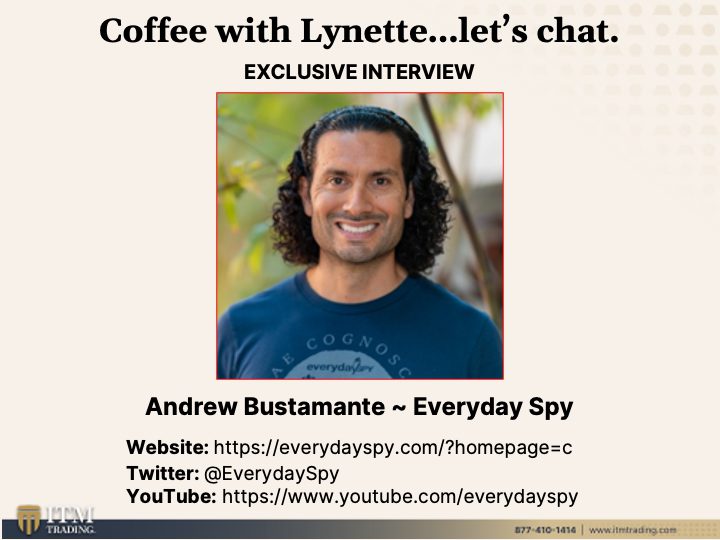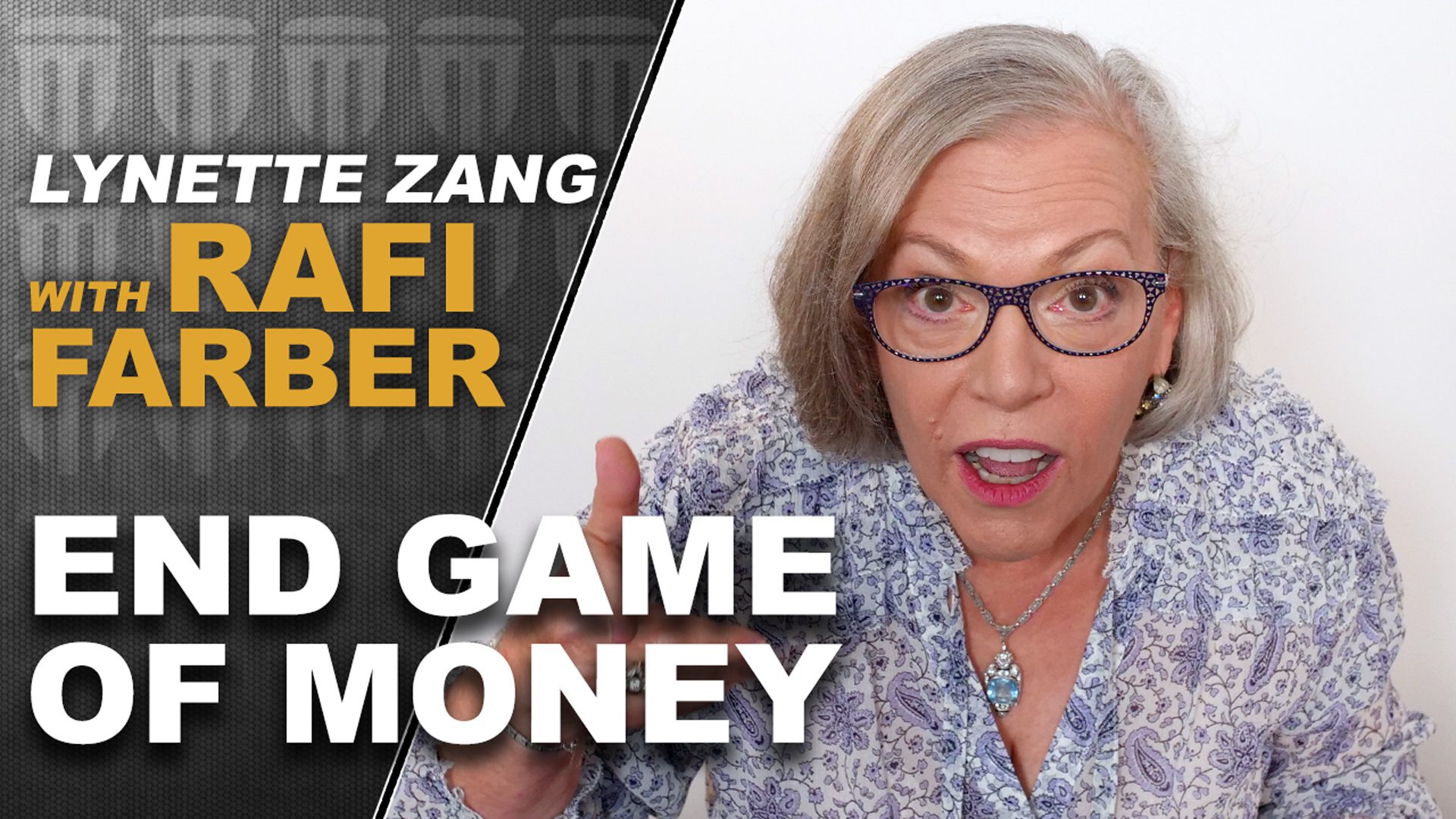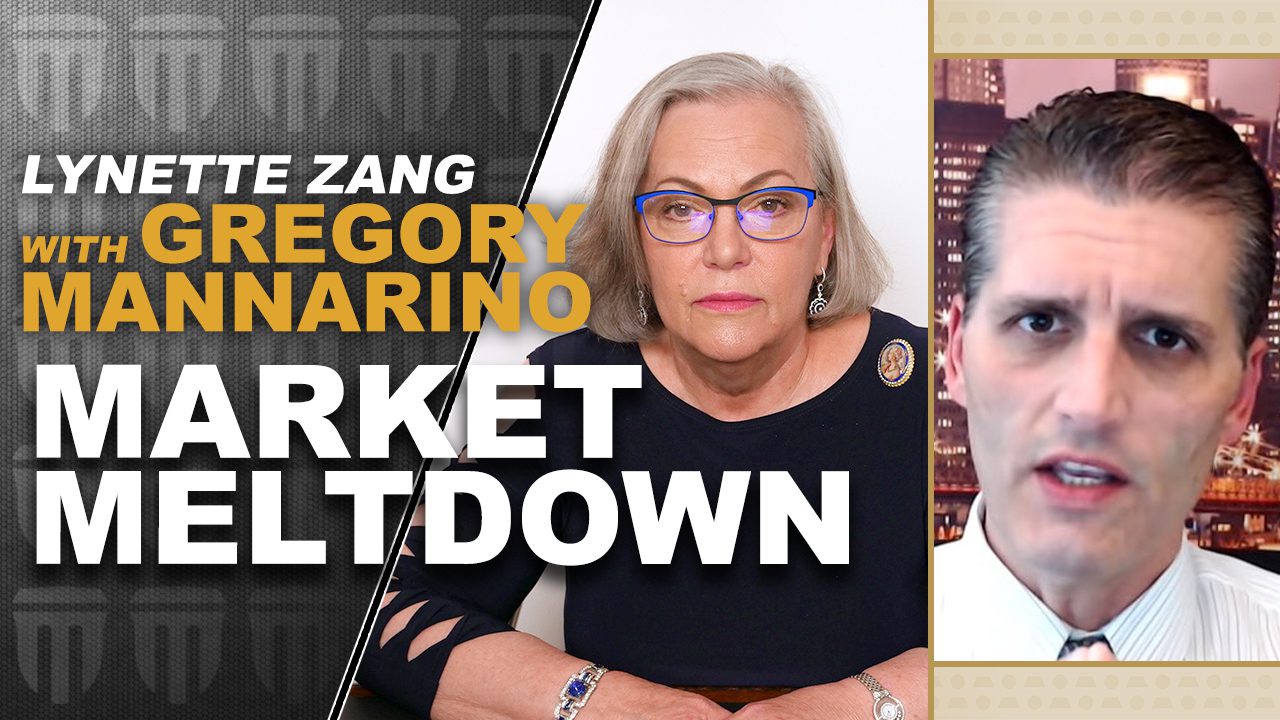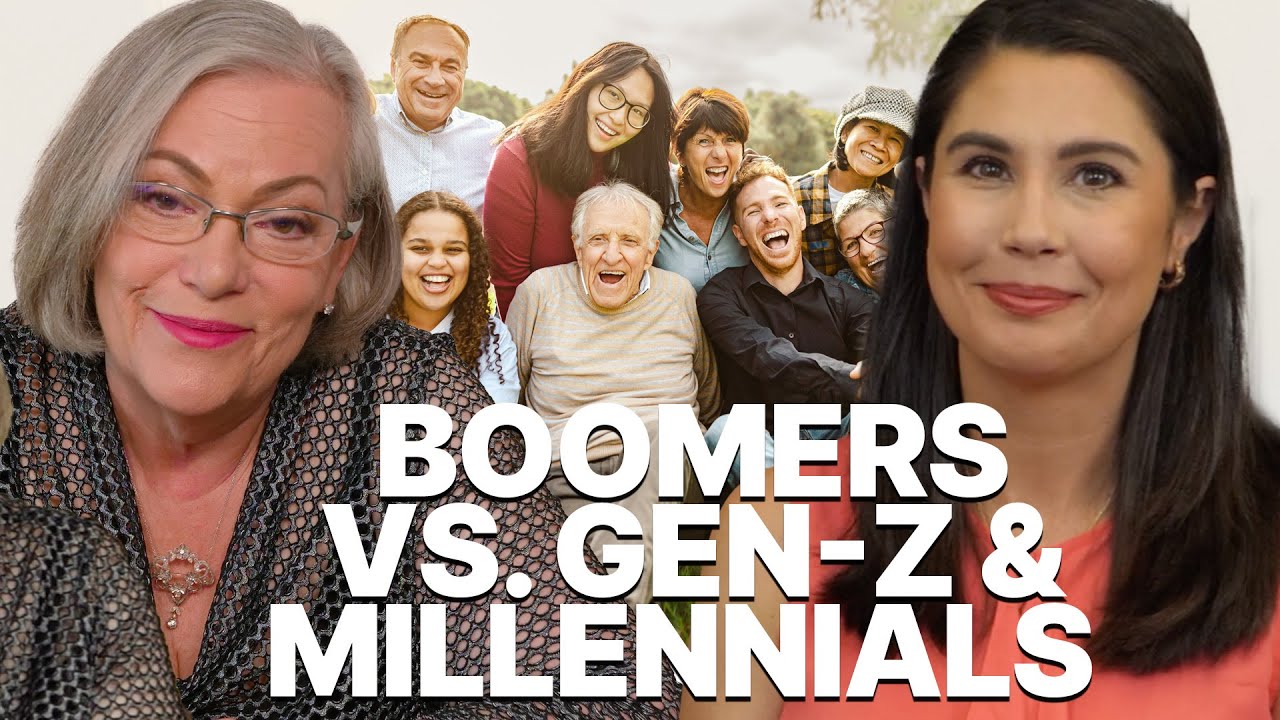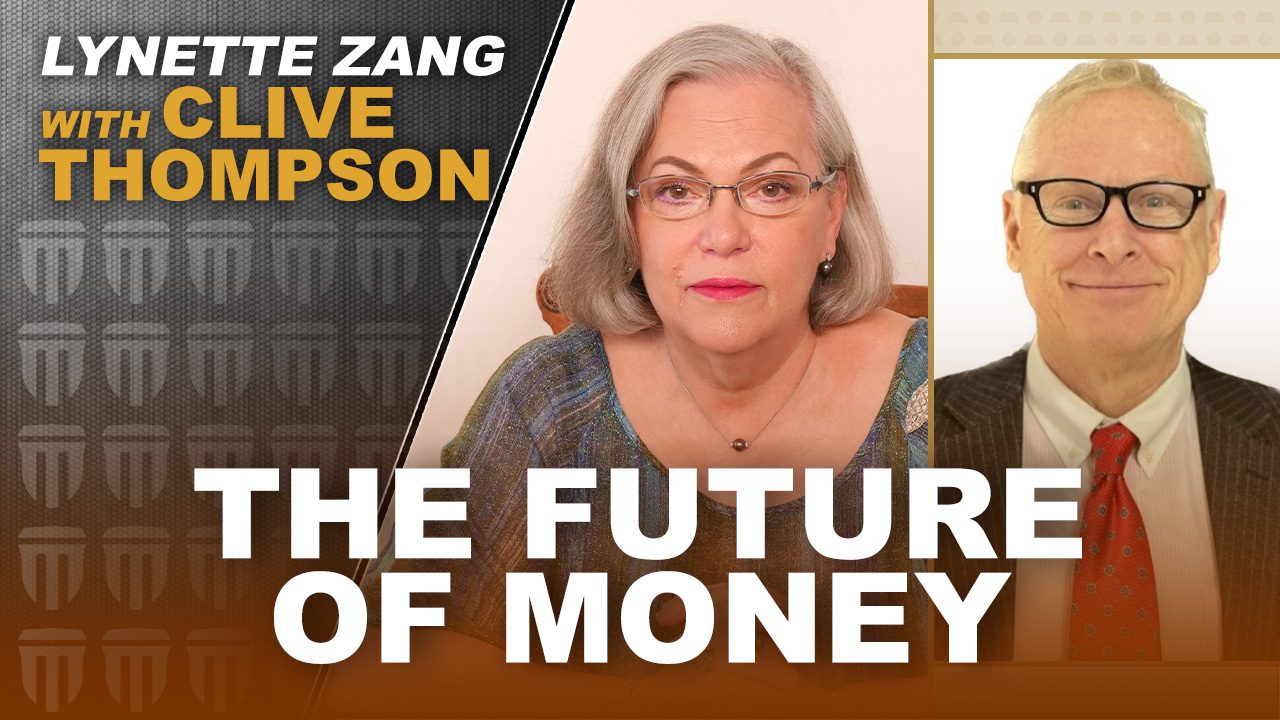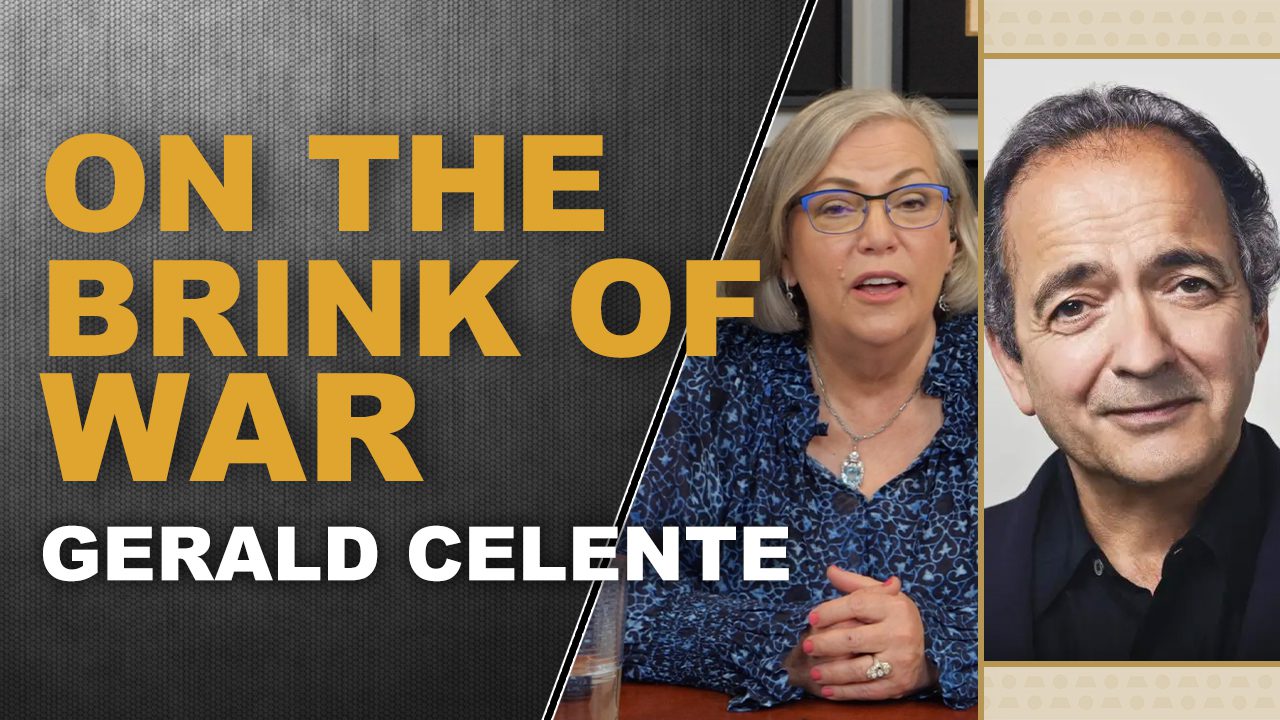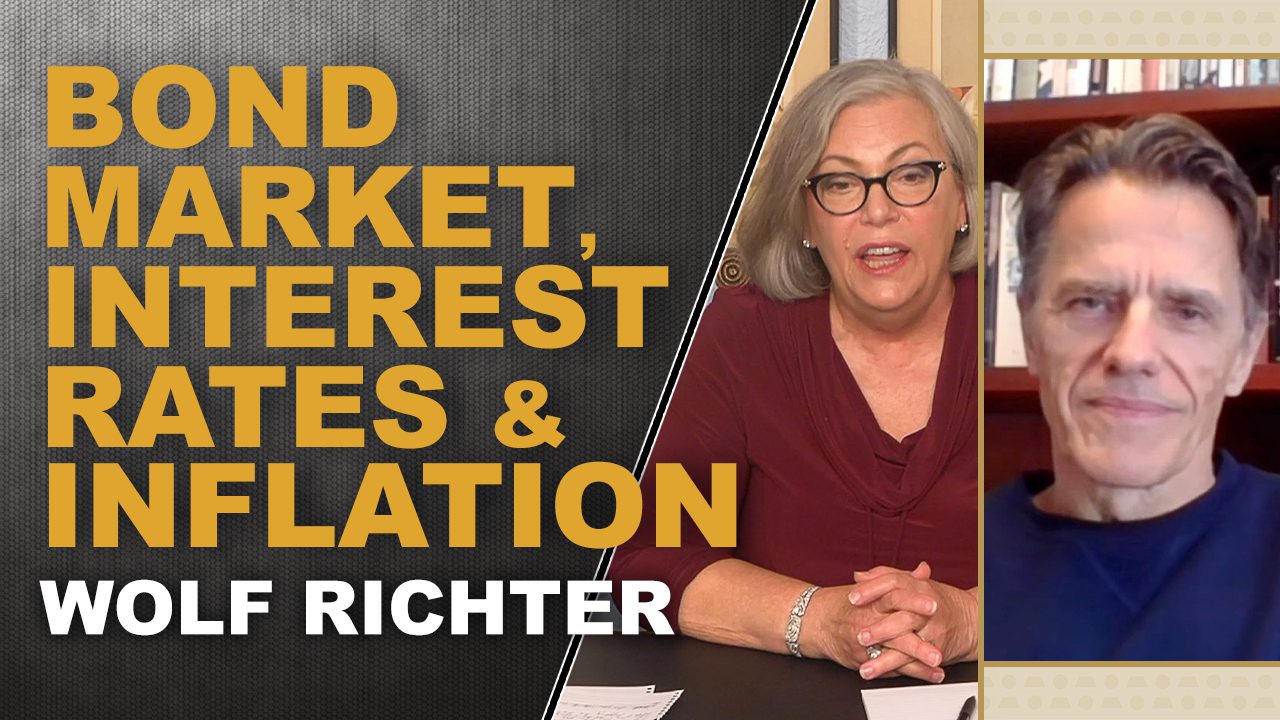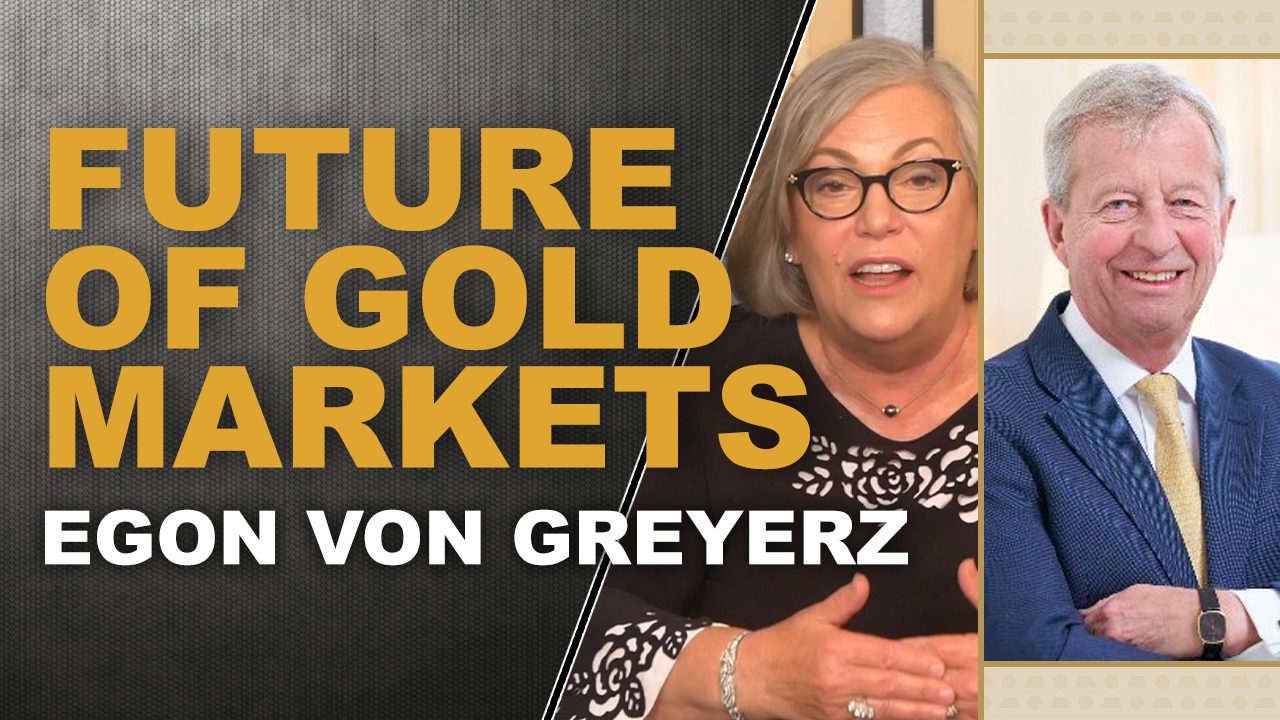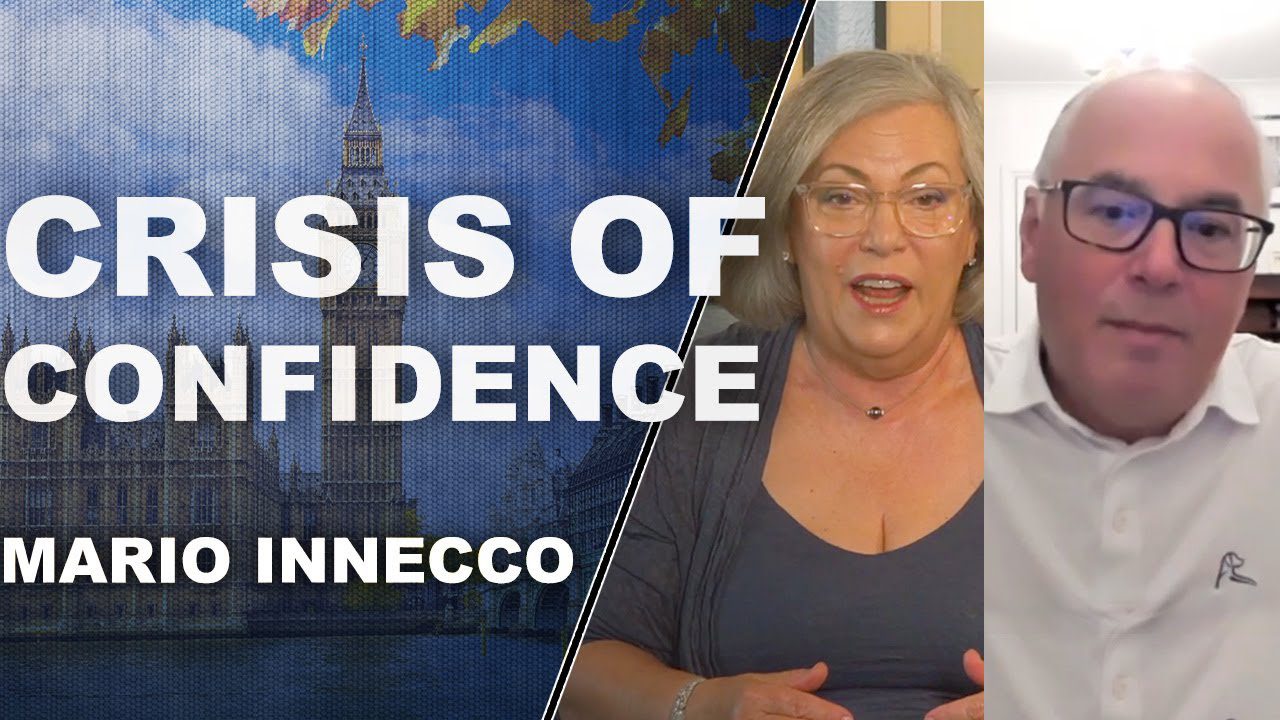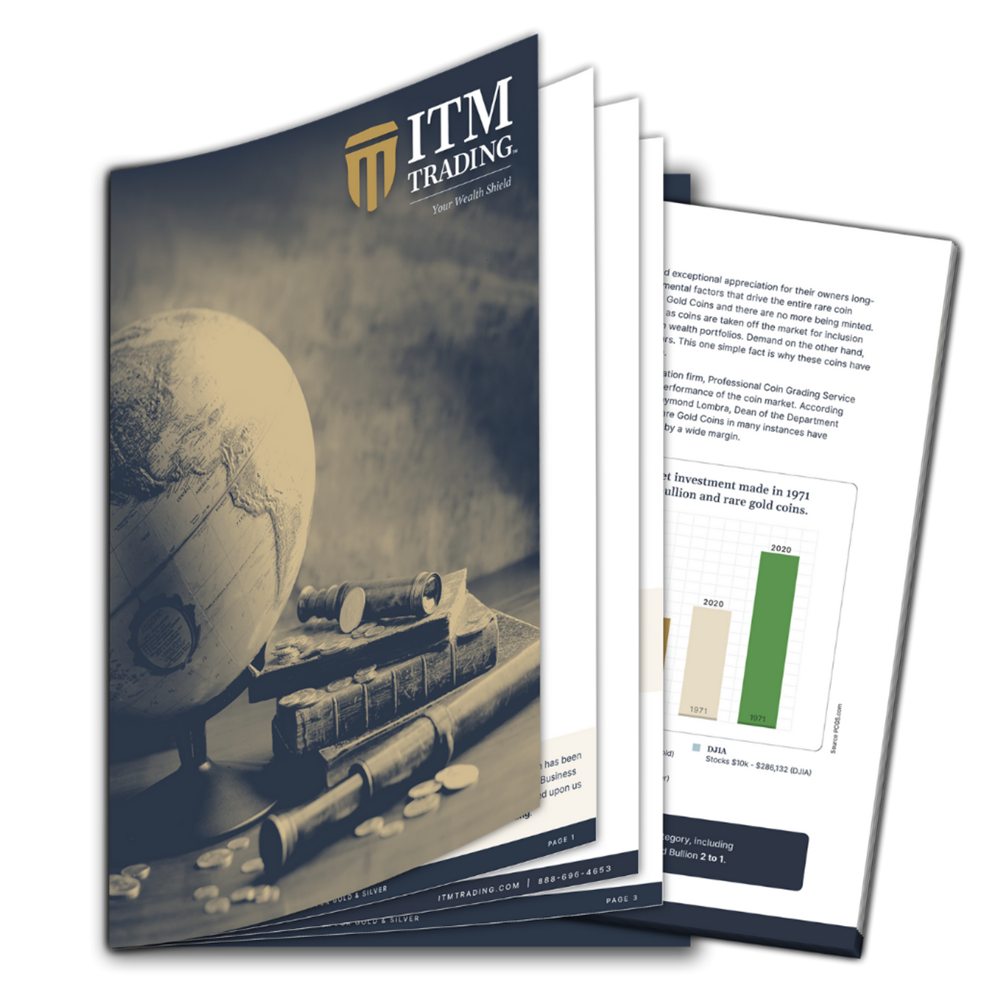EX-CIA Spy: Unveiling the Narrative on USD Dominance, CBDCs, Proxy Wars, & China | Andrew Bustamante
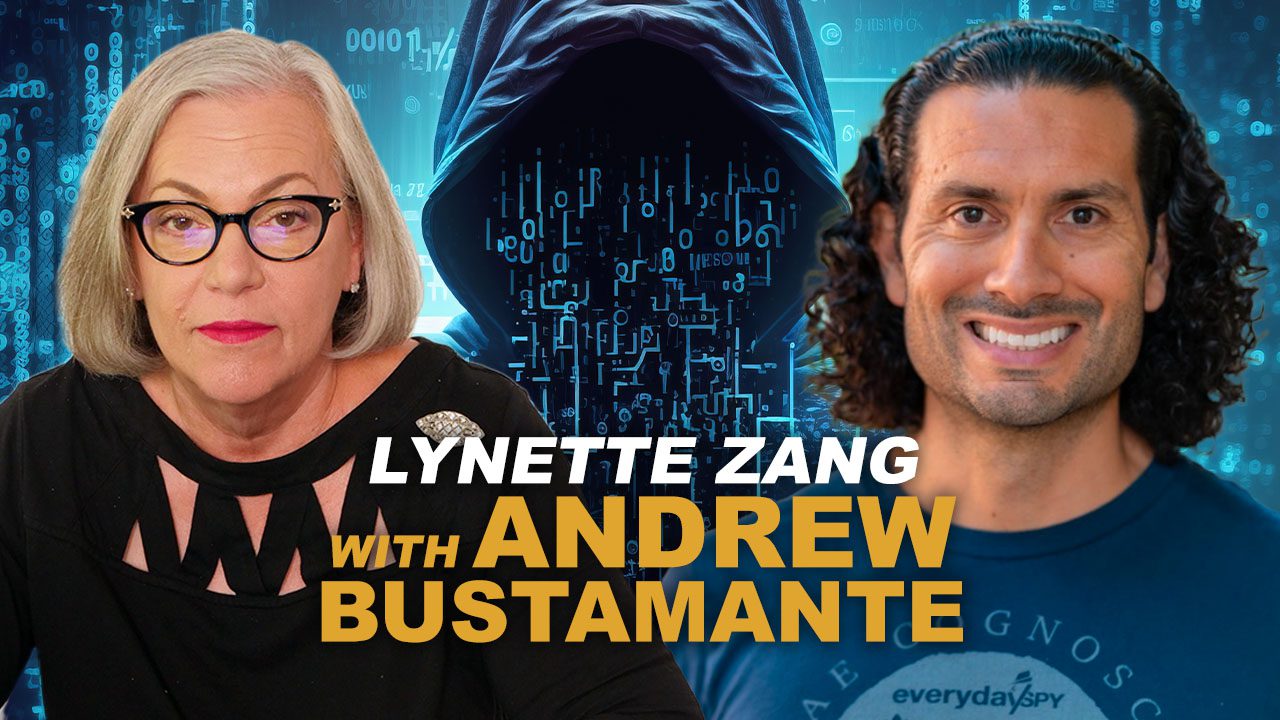
Welcome to Coffee with Lynette. I am so thrilled to welcome our guest today, Andrew Bustamante. Andrew’s fascinating background includes service in our nuclear program, in the Air Force, and subsequently a recruitment into the CIA, where he became a covert operative focusing on counterterrorism and cyber security.
CHAPTERS:
0:00 Welcoming Andrew Bustamante
0:37 Journey through the CIA and Air Force
6:45 Why Everyday Spy?
9:50 Shaping Public Narrative
13:12 Dominance of US Dollar
17:39 Purchasing Power
19:50 Is This a Proxy War?
29:24 Globalization
36:50 How Are You Positioning Yourself?
43:00 Everyday Spy
45:17 Is America On The Decline?
SLIDES FROM VIDEO:
TRANSCRIPT FROM VIDEO:
00;00;00;09 – 00;00;37;12
SPEAKER
Welcome to Coffee with Lynette. I am so thrilled to welcome our guest today, Andrew Andy Bustamante. Andrew’s fascinating background includes service in our nuclear program, in the Air Force, and subsequently a recruitment into the CIA, where he became a covert operative focusing on counterterrorism and cyber security. Could you just provide a brief summary of your journey through the CIA and the Air Force for us? So people understand where you’re coming from?
00;00;37;12 – 00;01;13;04
SPEAKER
Absolutely. So I grew up in a rural part of Pennsylvania where there wasn’t a lot of opportunity to go to advanced education or really kind of grow and develop professionally. So my parents, being military veterans, kind of always directed me towards military service. But when I was in high school, I actually met a very ambitious girl who was on one of my sports teams, and she introduced me to the military academies and she had gotten accepted to the Naval Academy.
00;01;13;12 – 00;01;35;10
SPEAKER
And that started me on this kind of rabbit trail where I learned about military universities and full ride scholarships to go to them so you could both get an advanced education and go and serve your country. So I made that kind of my mission. And my mom, when she found out that I was going down that road, she got behind me 120%.
00;01;35;26 – 00;01;53;02
SPEAKER
And that’s what took me to the Air Force Academy. And then at the Air Force Academy, I wasn’t a I wasn’t a gifted student by any means, but I was a hard worker. So I was able to keep my head above water. And the Air Force Academy is where I learned that I had a a talent for foreign language.
00;01;53;15 – 00;02;11;06
SPEAKER
And I learned Chinese while I was there. I studied Japanese while I was there, and I really kind of fell in love with the idea of foreign cultures on top of just American culture, which was a very different, you know, divergent path for a kid from rural Pennsylvania. And and that took me into yeah, that took me into the Air Force.
00;02;11;14 – 00;02;27;28
SPEAKER
My time in the Air Force. I learned how to fly. I learned, you know, survival in the mountains and survival in the desert. I, of course, had a foreign language and I was coming out of the Air Force Academy. So I really did have kind of the pick of the litter for what job I was going to take in the military.
00;02;28;08 – 00;02;54;05
SPEAKER
And I was assigned to a nuclear missile base in Montana, where I got the highest secret, the highest top secret classification that’s available to an officer in the military. And I ended up doing very well in that assignment. So it just kind of happened that I kept getting good opportunities and I kept performing to the expectation. And ultimately I decided I didn’t want to be in the Air Force anymore.
00;02;54;12 – 00;03;14;17
SPEAKER
I am not one for short hair and a shaved face, as you can see. Yes, And but I still wanted to travel the world and I still wanted to immerse myself in foreign cultures. So I started looking at the Peace Corps and it was actually during my application process to the Peace Corps that I was recruited by the Central Intelligence Agency.
00;03;15;03 – 00;03;37;01
SPEAKER
And it wasn’t until years later that I discovered that there’s a lot of overlap, a lot of commonalities between the kind of person who wants to work in the Peace Corps and the kind of person who succeeds at CIA. So that’s my brief summary of how I went from Enola, Pennsylvania, and had a chance to fill my passport up twice traveling around the world.
00;03;37;23 – 00;03;58;13
SPEAKER
So can I ask you what some of those overlaps are? Because that is really interesting. And I wouldn’t have thought that. Yeah, I didn’t realize that either. I wouldn’t have I would have never put one and one together, except except that I eventually became someone who helped recruit for CIA. So when people who are interested in traveling the world are kind of a unique breed.
00;03;58;20 – 00;04;22;03
SPEAKER
So first of all, believe it or not, there’s only about 25% of Americans who have a passport, which is kind of crazy, right? Yeah. Only one in four Americans have a passport. And of that 25%, only another one in four, another 25% ever use their passport to go further than Canada or Mexico. Wow. So, yeah. And that amazing.
00;04;22;07 – 00;04;47;12
SPEAKER
That means it blows my mind. I just got back from Italy. But, you know, I’ve used my passport a number of times in my lifetime, so yeah. So only about 7% of the entire adult American population ever uses their passport to go further than Canada or Mexico. And and it’s in that that you start to understand kind of the American mindset and why it is that people like you and I who travel the world are a different breed.
00;04;47;25 – 00;05;07;04
SPEAKER
Because if you’re going to be willing to travel the world, you’re embracing discomfort. You’re going to be somewhere where you don’t speak the native language, where the local food is not food. You understand where your diet has to transform. I mean, the lodging changes, if you’ve ever been, you’ve been to Europe. So, you know, in a hotel room in the United States is nothing like a hotel room in Europe.
00;05;07;09 – 00;05;29;00
SPEAKER
That is correct. You’ve got to subject yourself to their laws. You have to subject yourself to foreign cultures. You know, there’s different regulations for safety, for food, cleanliness, for social norms. Everything is really very different. And that’s just if you go from a first world country like the United States to another first world country like Spain or Italy, Right.
00;05;29;01 – 00;05;55;17
SPEAKER
It’s even more dramatic when you go to a place like Niger or like Ghana or if you go to Southeast Asia to to Burma or to Cambodia. So people who are willing to embrace or even, you know, excited to embrace that sort of foreign discomfort, that person is attracted to something like the Peace Corps. And that person is also very well suited for something like CIA service.
00;05;56;08 – 00;06;17;01
SPEAKER
And then on top of that, you have to add in the layer of intelligence. So with the Peace Corps, you’re looking for very resourceful, very resilient people who are able to do a great deal on a very small budget with very limited, limited oversight, because they’re building schools, they’re creating creating communities, they’re teaching microfinance and they’re teaching English.
00;06;17;02 – 00;06;41;07
SPEAKER
You know, in these areas of hardship, the same type of person is actually very well suited for clandestine operations as well. The resilience, the creativity, the the determination is really what’s required to live and work undercover, carrying out very dangerous operations where all of the odds are kind of stacked against you. It’s just one mission is more humanitarian and the other is more national security.
00;06;41;26 – 00;07;05;24
SPEAKER
I that is so interesting. Wow. Well, I knew I was excited to have you on because I’ve watched a number of your videos and you’re really interesting. And but before I get into the question that I am dying to ask you, I have to ask you this. You know, you started a company everyday Spy. Why are you out there talking about this?
00;07;05;24 – 00;07;40;20
SPEAKER
Why are you doing this? Because what CIA does for all of its intelligence officers is not very well publicized. Right? CIA changes our lives. It absolutely transforms us. And it’s very hard for me to communicate that in just a sentence. But the the depth of that transformation is enormous. I went from being someone who had self doubt and someone who was ambitious and someone who dealt with childhood trauma and someone who was kind of, you know, always eager and seeking external approval and validation.
00;07;41;00 – 00;08;07;10
SPEAKER
I went into CIA as a person that carried that baggage. And then within a few months of CIA training, I realized that I could turn all of that over and turn it into this just boundless energy and this boundless conviction to do basically anything that I put my mind to. And that’s really what CIA does for us. It gives us the process and the systems to unlock this incredible amount of potential in ourselves.
00;08;07;19 – 00;08;36;20
SPEAKER
It just directs that potential in clandestine operations, right? It’s got a very pragmatic purpose. But this, you know, just ethereal process and service that it gives each of its officers. So when I left CIA, I left for personal reasons. My wife, who was also an undercover officer with me, we had our first child and the life of two undercover CIA officers was not conducive to the life that we wanted for our children.
00;08;37;03 – 00;09;05;15
SPEAKER
So we ended up choosing to go into the civilian world and try to rebuild our lives in that direction. And and what I found is that when I applied the same skills that CIA had taught me in a corporate context, when I applied them in an entrepreneurial context, when I applied them to social relationships with friends and with neighbors and with, you know, car dealerships, for crying out loud, I had this incredible advantage over all the people around me because they had never gone through my training.
00;09;06;08 – 00;09;29;09
SPEAKER
And that’s when it clicked. That’s when it connected for me that I could actually teach the skills that transformed my life to others and potentially make some kind of small impact on the world. That makes the world a better place by equipping good people to do great things. Because we all know there’s plenty of bad people out there and they get plenty of time and opportunity to do bad things, right?
00;09;30;12 – 00;10;01;10
SPEAKER
Well, that kind of takes me to the next question on perception management, which is actually a formal program of the government. And Rupert Murdoch came in and helped make that happen. And I know that that’s something that you talk about a lot. So what would the media’s role in shaping Can you talk more about public perception and how the CIA or how the government forms that perception and why they would even do that?
00;10;02;02 – 00;10;25;21
SPEAKER
Yeah, absolutely. So there is a very real element of shaping public narrative that exists in the capitals and in all of the senior agencies all over the U.S. government. Right. And that narrative has a functional purpose. You know, the men and women who are behind the government are goodhearted, for the most part, goodhearted public servants who are just trying to make their career work.
00;10;26;05 – 00;10;48;22
SPEAKER
But they also understand a great deal of what’s happening in the world at a higher level than the average person. And they’ve been prepared professionally to be able to process that information. Right. And that’s not me saying that the average person can’t process what’s happening in the world. But there is a certain difference between having a specialist who’s an analyst in foreign affairs, who serves at the Department of State.
00;10;49;03 – 00;11;11;15
SPEAKER
When they read a piece of classified information, they will process and analyze it and synthesize it differently. So it’s very similar to the CEO or the CEO of a of a car and a car auto of manufacturing company is going to understand better how to utilize the information of their industry than a doctor will know how to use that industry information.
00;11;11;15 – 00;11;36;09
SPEAKER
Right. So it’s the same kind of process. But unfortunately, what happens with the federal government is that the chief ambition of the US government, very similar to the chief ambition of every federal government, is the sustainability and the persistence of the state. Right inside the United States, Americans have been led to believe that the government is there to serve us.
00;11;36;20 – 00;12;01;24
SPEAKER
That’s not really true. The government is there to serve the continuation of the government. And I think when you look at the Civil War and when you look at World War One and World War Two, when you look at the Great Depression, when you look at the great resignation, when you look at the great the the collapse of the real estate market in 2008, you see that the federal government, the government really is there to protect itself.
00;12;02;08 – 00;12;30;12
SPEAKER
When it’s when protecting the government also means helping the people, then that’s how you see the government help, whether it’s bailouts or whether it’s economic stimulus or whatever else it might be. But it’s a hard lesson for us to learn. And a big part of making that lesson a reality for federal workers is shaping a public narrative so that the majority of people have a reasonable explanation as to why the government is taking a certain action.
00;12;31;05 – 00;12;50;14
SPEAKER
So you see that right now with Ukraine, there is a public narrative about why we’re engaged in Ukraine, but that public narrative isn’t fully transparent in terms of all the reasons we’re engaged. It’s just giving the primary reason. The same thing is happening with inflation. The same thing is happening with the presidential races, right? And it happens at a state level, too.
00;12;50;21 – 00;13;25;20
SPEAKER
There’s always a narrative that the government has to shape for exactly what you said perception management. Because to govern means to control the narrative of the population, and that goes to our monetary system. Hmm. Right. And absolutely. Yeah. As an expert in the field, though, could you elaborate on the key factors that have historically contributed to the dominance of the US dollar on a global basis as the world reserve currency?
00;13;26;09 – 00;13;51;26
SPEAKER
Yeah, You know, this is a great question, Lynnette, and it’s one that people don’t often ask me. And the truth is that the rule of law, the one unalienable rule of law throughout the entire Earth, is the law of economics. It really is about supply, demand and controlling the price of of whatever desired product or commodity individuals need or want.
00;13;52;02 – 00;14;09;24
SPEAKER
And if you can put yourself at the crosshairs of that price point, if you have the ability to shift the supply demand curve, then that puts you in the most dominant position. So rewind back to World War Two, because prior to World War Two, the United States was going through a phase where we were just isolationist. We weren’t we weren’t part of a globalized market.
00;14;10;02 – 00;14;31;06
SPEAKER
We didn’t want a globalized market. We were a young country trying to figure things out. Well, after engaging in World War Two and seeing the rise and the dominance of the allies against the Axis POWERS Right. And let’s remember that the allies back at that time were the United States and China and Russia and many parts of Europe right?
00;14;31;15 – 00;15;02;19
SPEAKER
So that was the dominant party that those that was the dominant group of nations at the time. So when the United States won that, all of a sudden the United States found itself with a global presence, a presence in each of our allied countries, plus a presence in each of the dominated countries and after surviving ourselves through this, through our own Revolutionary War, one of the key pillars of our financial system was understanding the value of debt and leverage.
00;15;02;24 – 00;15;32;12
SPEAKER
And so so here we found ourselves winning a world war and finding that our allied partners and those that we defeated all needed to rebuild. And the one thing that we absolutely had was industry and financial backbone that we could use to leverage and basically force our debt out or take on the debt of other countries. Because we came out unscathed from World War Two.
00;15;32;19 – 00;16;02;06
SPEAKER
Right? We also came out with the largest stockpile of gold. Yes. Yes. So we ended up being cash rich. Right? We had strong cash flow and we had strong reserves of real assets that we could use to support that cash flow. So we leverage our allies. We leveraged our enemies that we had just defeated, and we essentially created an entire world built on American debt, debt to the United States.
00;16;02;19 – 00;16;24;22
SPEAKER
And that debt was something we were only going to accept in U.S. currency. And that’s really what led to the United States transitioning from being a manufacturing hub to being a hub of financial transactions. And most of the American GDP that we create even now, really does come from financial markets and financial tools and financial products more than anything else.
00;16;25;07 – 00;16;48;03
SPEAKER
So we’ve become experts in in managing money and moving money and taking transactions and taking payments from the transactions of moneys. And the world has become very accustomed to working in U.S. dollars, paying in U.S. dollars. And guess who controls the flow of U.S. dollars? We do. So if we want to increase the price of the U.S. dollar, we take them off the market.
00;16;48;03 – 00;17;09;06
SPEAKER
And when we need to stimulate our economy, we flooded with American dollars. And we don’t really mind that that impacts our allies because they are already indebted to us anyway. So we have created this world now where Europe is dependent on the United States and our financial system. And, you know, global trade is heavily dependent on the United States dollar.
00;17;09;06 – 00;17;31;16
SPEAKER
In the United States system. And that’s a big part of why we are in such an interesting time right now, because countries are competing now to liberate themselves from the U.S. dollar. In the U.S. system, countries that are creating alternatives to our systems. And it’s a very it’s a very difficult time to policy your way through that as our current administration is discovering.
00;17;32;09 – 00;17;53;23
SPEAKER
Yeah, well, I mean, when we abuse the power that we have been given, others have noticed, and the other part that I never hear anybody talk about is that when you look at the value of any of the fiat moneys that are out there, so could be the euro, the US dollar, the yen, it doesn’t really matter. Take your pick.
00;17;54;23 – 00;18;18;29
SPEAKER
There’s virtually no purchasing power left in them because it’s been inflated away. But people don’t realize that. Yeah, it’s very interesting because you’re exactly right. We have these countries that we compare ourselves against, but they don’t have anything backing up their their fiscal policy. The best that they have to back themselves up is debt stocks that they have of American debt.
00;18;18;29 – 00;18;50;22
SPEAKER
Right. They’ve become they’ve learned how to basically mirror our process without understanding that the United States, if it chooses to, could just choose to default on a debt very similar to what happened when the United States locked all Russian currency and Russian assets in foreign banks. Right. Right. So it’s a it’s an interesting world because if you aren’t tied to some kind of standard, like a gold standard or some kind of precious metal, then you really are just messing with pretend currency.
00;18;50;22 – 00;19;13;08
SPEAKER
It’s almost like a cryptocurrency. It doesn’t have anything behind it except for the trading power of people demanding the currency itself. And that’s why you’ve seen, especially in Latin America, the kind of the currencies just collapse. They can’t keep up with themselves in Africa, at the same thing happens and you know that the yen is tied to the US dollar and I believe and the the renminbi.
00;19;13;08 – 00;19;33;02
SPEAKER
And China is kind of one of those things that is is a bit finicky and heavily state controlled. So I don’t gamble hard on it, but it’s also the most recent currency to be pulled into the the SDR. Exactly right. So I think it took a while for them to prove that they had the kind of stability to be a global currency.
00;19;33;23 – 00;20;01;27
SPEAKER
Well, you know, they kind of change rules to make some of the things that they want to have happen, happen because there is no currency that has ever retained its title for the world reserve currency forever. And, you know, and I look at what’s happening between Russia and China and the U.S. and our allies, you have a different perspective on it made probably a much better perspective.
00;20;02;05 – 00;20;25;21
SPEAKER
Can you explain to all of us out there what’s really happening in this? Is this a proxy war? Is this a real war? I mean, what’s going on in your opinion? Yeah. So, you know, there’s a lot of concern that we are facing down the barrel of World War three. And when most people think of World War three, we really think of World War Two.
00;20;26;04 – 00;20;52;02
SPEAKER
In the modern day. But really what we’ve seen, if you look over history, is that wars evolve, war behavior evolves, just like human behavior evolves, right. And that’s why the world. Exactly. New tools, new strategies, new risk, new new risk portfolios. So that’s why World War Two looked so different from World War One. And that’s why the Vietnam War looked so different from World War Two and the war in Afghanistan.
00;20;52;02 – 00;21;21;03
SPEAKER
And and then starting in about 2011, we entered into a phase that most military strategists call the season of the proxy war. And a proxy war is when a poor third world country or a poor developing nation becomes essentially the the staging ground for world powers to compete against each other by funding some kind of civil conflict in that third world country.
00;21;21;18 – 00;21;47;25
SPEAKER
So we all saw this with Syria. Syria was a very clear civil war funded east versus west. The same thing happened in Libya. Libya was another civil war where the East competed against the West by funding different factions inside Libya. We saw it in Yemen. The same thing happened in Yemen, Right. What happened in Ukraine is only slightly different because what you saw was the sovereign country of Russia invade the sovereign country of Ukraine.
00;21;48;06 – 00;22;10;08
SPEAKER
However, in the eyes of the Russians and the eyes of the Ukrainians, it was much more of a civil conflict, not an interstate conflict, because about 20% of Ukrainians identified as Russians and most Russians believe that Ukraine belongs to Russia. The the cultural overlap the historical overlap is significant. So from the outside looking in, we see two sovereign nations.
00;22;10;08 – 00;22;40;27
SPEAKER
But from the inside, that’s not how they saw each other. It’s not they saw themselves. And that that dichotomy of Ukraine versus Russia has become more solidified over the course of the war, as Ukrainians are. You know, bonding together. Remember that on February 24th, 2021, when this war started, Ukraine was a fractured place. I mean, it was five thumbs and it was it was corrupt generals trying to stash money away from other corrupt generals.
00;22;40;27 – 00;22;58;10
SPEAKER
I mean, they were there was infighting galore. It rated three out of ten on the index for democracy and evolving democracy. I mean, it was a failing country in many, many ways right before it was invaded. But when it had a common enemy, when Russia became a kind of common enemy, it solidified a lot of those groups into each other.
00;22;58;17 – 00;23;25;16
SPEAKER
That didn’t eradicate the corruption, but it did kind of create a sense of strong unity and purpose among that Ukraine, the Ukrainian people. And that is really what served to make it the next proxy war. So now the United States can deplete the Russians through Ukraine instead of depleting the Russians and other locations. And I think NAITO, this is what’s so interesting, especially NATO’s sees it for what it is.
00;23;25;29 – 00;23;50;00
SPEAKER
NATO’s and the U.N. see that Ukraine is a proxy war between the United States and Russia. That’s why you don’t see Germany and France doing exactly what President Biden tells them to do. These are the two largest economies in Europe, and they’re both pushing back against the United States. You see Hungary and Bulgaria, who are part of Nieto outright siding with Vladimir Putin.
00;23;50;05 – 00;24;16;27
SPEAKER
Right. So there’s fractured division within NAITO. It’s not a solidified group. And even in the U.N., when you read about the U.N. resolutions against Russia, the the fine print, if it’s being left out, is that the wealthiest largest countries in the world are actually abstaining from those resolution votes. China, India, Brazil, South Africa. These are countries part of the BRIC trading bloc to say those are the BRICS.
00;24;17;18 – 00;24;42;04
SPEAKER
Yep. Who are consistently abstaining and not admonishing Russia for invading Ukraine. So you can see when you just get one level deeper than what the media is telling you, you can actually see in practice and in the proof that this is an economic conflict, it’s not a conflict of ideology or democracy or authoritarianism or fairness or legality of war.
00;24;42;04 – 00;25;02;19
SPEAKER
It’s none of those things. It’s a proxy conflict about economic benefit. So where do you think this is going to take us? That’s the that’s the million dollar question, right? The more than million dollar question. I think the most likely outcome that we’re going to see here is something very similar to what we saw with Korea. There’s a sort there’s a South Korea and a North Korea, right.
00;25;02;19 – 00;25;32;09
SPEAKER
There’s a demarcation zone, a demilitarized zone in between and essentially two separate economies. So right now, Russia controls about 20%, 17% of Ukraine. And Ukraine is currently in the middle of a counteroffensive. And there’s huge, huge stakes in this counter-offensive. If they’re successful, then that should mean that they have earned additional support from the West. But you can see with what the West has done in preparing them for this counteroffensive, that it’s a very limited investment.
00;25;32;20 – 00;25;52;27
SPEAKER
It might sound cool to get tanks and jets, but yet, you know, five tanks and seven jets doesn’t make a war that doesn’t even make a squadron. And you need multiple squadrons to fight an air fight or a ground battle. So it’s difficult to coordinate and then not only that, but there are multiple different platforms and everybody needs training.
00;25;53;04 – 00;26;21;16
SPEAKER
And then what about maintenance and ongoing care? So there’s there’s holes in the story, but the average person doesn’t understand the story as a whole. So it just fits the narrative that we’re defending democracy. But the most likely outcome I see at this point is some kind of demilitarized zone where Russia gets to retain control of its resources that are located in eastern Ukraine that are so vital to Russian energy and Russian sustainability.
00;26;21;25 – 00;26;50;10
SPEAKER
And Ukraine essentially has to settle with everything that Russia has not taken so far. That’s the most likely outcome. The next most likely outcome, unfortunately, I think, is the fall defeat of Ukraine, because Russia has all the resources it needs to engage in a long, protracted war. Ukraine does not without the support of the West, Ukraine doesn’t have what it needs to sustain itself and there’s no comparing the populations or the army sizes.
00;26;50;18 – 00;27;13;22
SPEAKER
And the only reason that we see Ukraine sustaining this long is because of their grit and spirit, but also because they’re using the asymmetrical advantage of advanced weapons that they’re getting from the West. But every weapon that the West ships to Ukraine is one less weapon that the use that the United States, the UK, France, Germany has to defend itself against the rising tide of China in the east.
00;27;14;25 – 00;27;38;14
SPEAKER
Do you think that all wars have to be physical, though? Absolutely not. We weaponized the dollar. We weaponized the global financial system. So, I mean, is it necessary for these wars really to be physical or is that what we’re used to seeing? Is that just a tool of perception management? Yeah, You know, it’s a great point. And you’re right there.
00;27;38;26 – 00;28;10;14
SPEAKER
There is a an element of the fact that we’re always in conflict, always there’s always financial conflict, there’s economic conflict, there’s trade conflicts, right? That’s why tariffs exist. That’s why taxation exists. That’s why you build trade blocs and trade unions, because you’re essentially trying to leverage partnerships and and and loyalty against enemies and foes that you don’t want to take your market share or you don’t want to to take advantage of your natural resources, whatever it might be.
00;28;10;27 – 00;28;35;07
SPEAKER
So you’re right that there’s constantly conflict and people don’t really think of it that way. But that’s economic warfare and and information warfare are always happening. Always, always happening. But it’s not until blood starts to spill that the average person really wakes up. And governments know that when you want people to get when you want people to care, there has to be blood.
00;28;35;28 – 00;28;58;29
SPEAKER
There has to be blood, and there has to be a villain and there has to be a victor and there has to be a you have to pick sides. It’s a human nature thing. Human beings are tribal creatures, right? We need to belong to a larger group to feel fulfilled. Even the most lone wolf among us still wants to belong to a group of lone wolves.
00;28;59;05 – 00;29;28;21
SPEAKER
Right? We all. Yes, We need that connection. We need that label. So the fastest way to organize and direct individuals is to give them a rallying cry and point them at an enemy. And that’s one of the things that’s always very useful about armed conflict and the perception management of this. Do you think any of that has to do with the U.S. global dominance waning?
00;29;29;02 – 00;30;01;18
SPEAKER
Because, you know, you brought up before that the world is dependent upon dollars in trade and yet we’ve been witnessing a huge drop off in dollars being used as global trade. And you also brought up the BRICS. So we’ve seen a rise over there. So can you comment on that? Yeah. My suspicion here is that during the 20 year period where America was focused on the global war on terror, the G8, during that 20 year period, nobody else was focused on that conflict.
00;30;02;06 – 00;30;22;03
SPEAKER
Russia wasn’t focused on that. China wasn’t focused on that. Iran was funding it. They didn’t they didn’t try to combat it. Right. So essentially, the United States federal government had a 20 year distraction and our enemies saw the opportunity there in that. Right. So we had to figure out how are we going to fight this war, fund this war.
00;30;22;03 – 00;31;04;24
SPEAKER
It was very similar to the war on drugs that we had in the eighties. Right. It was a losing battle, very difficult to quantify success. So that gave our our adversaries a 20 year advantage in being able to build, organize and structure alternatives to our economic dominant positions. And while they I think we owe a certain debt of gratitude, as silly as this sounds, there is absolutely a debt of gratitude that the United States population owes to COVID because it was the COVID crisis that woke us all up to the fact that our economy and the globalized economy was so heavily focused on a single supply chain that went through an adversarial country.
00;31;05;00 – 00;31;39;22
SPEAKER
Yeah, without COVID, nobody would have seen that until it was potentially too late. And now we see the diversification of supply chains and now we realize, yeah, and now we realize that, you know, that Chinese policy, Chinese manufacturing policy and financial policy can be dictated and changed overnight. We would have never seen that otherwise. You know, I was a new stockbroker in the eighties, and I remember all of this talk about globalization and how they started to shift the manufacturing to China, to other countries.
00;31;39;22 – 00;32;15;25
SPEAKER
And I remember thinking to myself, Yeah, I don’t know if this is such a great idea. So now we finally figured that out. I know that that helped me find the hole in my person personal strategy, which was I did not have a bug out location. But you know, what do you see from your vantage point? You know, with China, what signs suggest that they might be on the path to becoming the new global financial leader?
00;32;16;01 – 00;32;34;10
SPEAKER
Because I’m not so sure. Yeah, no, I’m not convinced either. I think that we’re I think that we are in a position where there’s going to be a good fight. So there’s a few things that I lean on that I think are worth noticing or worth noting as, as, you know, proper indicators of their of their ascension. Right.
00;32;34;21 – 00;32;56;16
SPEAKER
First, they’re doing more trade than they’ve ever done before. They’ve got countries that are indebted to them. Yeah, right. And granted, many of those countries that are indebted to them are not good debtors. So they haven’t learned that lesson yet. They’re just now kind of facing what happens when debtors don’t pay their debts as part of their Belt and Road Initiative.
00;32;56;26 – 00;33;17;17
SPEAKER
Now we learn that earlier on in our national experience, but they’re learning it now. Now, along with that, they also have the benefit of basically being the only alternative to the United States. So any country out there that doesn’t want to do business with the United States is looking to China. Yeah, and China has China has this huge population.
00;33;18;02 – 00;33;39;27
SPEAKER
And within that population, they have almost absolute control of that population. So if they want to make their population wealthier, if they want to adjust prices, if they want to create or shrink businesses, they can do all that. So anybody who who wants an alternative to the United States can get that with China. And then on top of that, China doesn’t have the bureaucratic, slightly slow process that we have.
00;33;40;16 – 00;34;07;18
SPEAKER
So whether it’s humanitarian projects or whether it’s military projects or any kind of coordination project, it doesn’t have to go through seven committees and have 12 votes and have to wonder whether or not it’s at the same time as a senatorial election, a congressional election or a presidential election or a gubernatorial election. Instead, China just has this ability to make a rapid decision and support or reject a coordination request from a foreign country.
00;34;08;09 – 00;34;44;27
SPEAKER
So these are some of the pieces that make it attractive for business and attractive for collaboration. And those elements are what make it attractive financially for Oregon and for other groups, too, because if they can put their money in Chinese banks and those Chinese banks can make faster policies that return a higher investment, and if those Chinese banks can act as an alternative to U.S. banks and we and nobody trusts European banks now either, because a U.S. like we learned within the last two years that the US basically now can tell European banks to stop doing business right, and that that’s not something that comforts many countries.
00;34;45;02 – 00;35;31;08
SPEAKER
I’m not just talking about adversarial countries either. I’m talking about neutral countries as well, because if you’re a neutral country, you want to pride yourself on being neutral, not controlled by by a larger party. So it’s an interesting it’s an interesting scenario. It’s an interesting world that we live in because it’s very similar to to the way people describe the race between like presidential races when they say that you have to choose the lesser of two evils, I’m not even really sure which is, except that the ideas in China and the way that they control the population, the way that they have, you know, absolute control over everything, Are they exporting those ideas globally?
00;35;31;08 – 00;35;55;19
SPEAKER
And what what does that mean? I don’t we’re not really a true democracy. Correct. And that’s something people don’t like to admit either. So I think that’s a very, very valid point. Lynn, It Right. So are they going to be exporting those ideas on a global basis because it is so much easier to do business and might that not be what AC DC could be about?
00;35;56;07 – 00;36;31;05
SPEAKER
Exactly. Right. Right. Because now all of a sudden you have your reducing the friction points, you’re increasing the process effectiveness, You can still make money on the transaction fee and you control the currency and it’s all under strict government control, especially if it’s a cbdc that’s coming from a central government like the Chinese government. Right? Or I mean, and frankly, any government, because if you read the documents from the IMF, you know, the Fed, they can just have their finger on that button of the economy.
00;36;31;05 – 00;36;55;06
SPEAKER
24 seven and they would in real time get the results of their policy. Oh, yeah, that makes me feel real good that that’s frankly why I buy physical gold and silver in my possession so that it doesn’t run those geopolitical risks and those counterparty risks. What are you doing for yourself, if you don’t mind my asking? Yeah, no, absolutely.
00;36;55;06 – 00;37;20;29
SPEAKER
So for sure there’s an element in diversifying our investment portfolio. So we hold multiple types of currency. We hold multiple types of investments because you never really know what you’re going to need and when you’re going to need it. Not to mention the fact that what you’re trading in is demonstrative of where you’re coming from. So if you’re trading in euros with someone, they are going to know that you have access to euros they’re going to and going to assume certain things about you.
00;37;21;03 – 00;37;58;01
SPEAKER
If you’re trading in dollars, the same thing if you’re trading in in renminbi, the same thing. So you always want to have a mix of currencies so that you are, one, diversified in case one currency crashes and another doesn’t. But then with physical assets, you’ve also got the opportunity. There’s there’s pros and cons with physical assets. When you have gold, when you have silver, when you have diamonds, when you have, you know, even if it’s art, when you have assets that can be traded for some kind of fiat currency, you you have to be very closely attuned with the direction that the market is going in order to maximize the return on the investment.
00;37;58;10 – 00;38;18;21
SPEAKER
You also have to make sure that you have a way of being able to trade at a peer level. If you have a two ounces of gold, you don’t want to use your two ounces of gold to trade for groceries. So you need to have a much smaller foundation, right? Silver for that, where you have a farm, Right.
00;38;18;21 – 00;38;39;20
SPEAKER
So you need to have like a plan for how that works. And that’s one of the things that comes with physical assets. So it’s really a question of whether or not the individual wants to be stationary or wants be mobile. For someone who wants to be stationary and who wants to have long term survivability in a single location, especially because maybe they are they carry their older in years or they have a property that they’re trying to protect.
00;38;39;29 – 00;39;07;05
SPEAKER
In that case, physical assets make all the sense in the world because you you will always be able to create a trade network where you can break down your silver, your gold, your diamonds into a smaller currency. But for the mobile group, somebody who wants to get up and leave, I’m of the mobile variety. It’s better to have liquid capital, actual fiat currencies, and then fiat currencies are tied back to banks that are diversified.
00;39;07;21 – 00;39;42;14
SPEAKER
I don’t just mean Western banks and Eastern banks. I also mean some of your neutral banks and you’re extremely corrupt banks that exist in island nations of course, you’re assuming that the fiat currency retains some level of purchasing power. And since they basically all admit that there is virtually no purchasing power left, the only thing that’s holding it together is the confidence of the public, because the confidence on all the different levels bank to bank, central bank to central bank, bank to central bank, those are all gone.
00;39;42;18 – 00;40;24;07
SPEAKER
Those are all gone. And that started to go away in 2008 and it’s just escalated. So that’s the problem with intangibles, is they absolutely 100% require a level of confidence that you may or may not get. Whereas even in the physical world, I mean, there are different things for different functions, you know, and there are certain this is not one of them, but there are certain coins just this big that can be, first of all, traded anywhere globally and can generate many in even today’s terms, millions of dollars or millions of wherever you are.
00;40;24;15 – 00;40;54;11
SPEAKER
So this is small, portable and truly invisible with the broadest base of buyer. So you might want to think about that for a minute too, because that’s the problem with the Fiat system is it’s a very narrow base of buyer. It’s whoever is in that corridor. Whereas with physical, all metals, you know, it’s in manufacturing, it’s in the financial system, it’s in food, it’s in art, it’s in space, it’s in, it’s, it’s everywhere.
00;40;54;19 – 00;41;22;11
SPEAKER
So you have a broader base of buyer, therefore just easier to move globally if indeed we go into a global hyper inflationary event. Yeah, I don’t disagree with you. I don’t disagree with you on the monetary theory of it. The place where I come from is that there’s also a significant vulnerability in the fact that a physical asset belongs to whoever physically controls the asset.
00;41;22;11 – 00;41;52;24
SPEAKER
Correct. So that’s a major risk, especially when you talk about, you know, the large term chaos or the or the destabilization of any country. And now it really becomes not about how many coins you have in your pocket, but whether or not you can keep your coins in your pocket. And that’s a that’s a difficult question. So when you have a fiat currency and all hell breaks loose, you know, you can you’re you’re less likely to lose everything when a portion of your fiat currency is taken away, especially if you have diversified fiat currency.
00;41;53;01 – 00;42;14;10
SPEAKER
But if we’re talking about end of days type of stuff, then then the only thing is going to save us is going to be baseball bats and spears anyways. Well, we may need them for a minute. And I’m not talking about end of days, I’m talking about end of the current financial system. That’s what I’m talking about because it’s just been a big experiment.
00;42;14;10 – 00;42;43;20
SPEAKER
And moving us into a more surveillance economy is is the next experiment. But I think it’ll take us full circle to like more of a feudal system and we’ll see. Yeah, I think it’s a again, I’m always a fan of diversifying your interests, hedging bets in all directions. It’s silly for people not to invest in precious metals. It’s also silly for people to overinvest in precious metals because you never know how it’s going to turn out.
00;42;43;24 – 00;43;05;08
SPEAKER
So the best thing to do is to is to diversify to the extent that you’re comfortable and then, of course, to tailor it to whatever your lifestyle is. Yeah, you always have to do what you’re comfortable doing. So, I mean, I didn’t even touch on half the things I want to talk to you about. It went so fast, but I want to take you back to everyday Spy and you know who’s it for?
00;43;05;16 – 00;43;46;25
SPEAKER
How can we learn about it? You know? Tell us more about this and what we can do as every day Americans to determine, are we being lied to? Are we or is that the truth? So you’re exactly you’re exactly right there. Learn that every day. Spy is a training platform for everyday people, and we train people in skills from lie detection to understanding economic espionage, to understanding the conflict between the United States and global players as well as learning, you know, tactical spy tools and techniques for making better investments, for connecting with networks of people who have shared interests in financial security, long term investments, building a business, building a career.
00;43;47;12 – 00;44;16;27
SPEAKER
It’s a very multifaceted organization that we’ve created with Everyday Spy, because when a spy is undercover, the most dangerous part of their operation is honestly everyday life, because it’s not dangerous to. Go in and infiltrates, you know, a known target with weapons and a plan that’s not nearly as dangerous as just getting in your car, going to the dentist and signing your receipt in the wrong name.
00;44;17;22 – 00;44;38;15
SPEAKER
So there’s a great deal. And you must know my dentist, don’t you? So the focus of everyday Spy is on protecting the everyday person by giving them the spy tools and techniques that they need to get ahead, ahead in business, ahead in personal relationships, ahead in personal security. And you can find everything that everyday space.com. My home page is there.
00;44;38;25 – 00;45;02;18
SPEAKER
I have a I have a full description of everything that you might need. I have a fantastic starter kit for people that teaches them how to identify when people are lying to them, how to overcome anxiety, how to maximize their risk tolerance so they can make and take proper risks that protect and benefit them. And it’s really been a privilege and honor to continue to serve the American people out of uniform and out from undercover.
00;45;03;02 – 00;45;33;09
SPEAKER
MM That’s been phenomenal. Andy, I hope you’ll come back again, because I have a whole list of questions I wanted to ask you that we just didn’t have the time for. No, I’d be happy to come back. Oh. Is there anything else that you would like to tell people that they need to know? In parting? So what I would love to do is give people a little bit of peace of mind because there’s a lot of rhetoric out there that America is on the decline and America is going to fail and America is going to collapse.
00;45;33;20 – 00;45;55;23
SPEAKER
And that’s not what I see at all. I see that America is on the ropes, but we are stronger and more resilient than any country in the world. And we’ve proven that time and time again. And sometimes, as most people know, if they’ve grown up in public school or if they’ve grown up in the country, sometimes you got to get smacked across the face before you wake up to reality.
00;45;55;25 – 00;46;29;01
SPEAKER
Sometimes the donkey has to kick you in the gut for you to learn not to stand behind it right. And we’ve had a little bit of that recently, and I don’t think that’s the end for us. I think that we’re seeing some policies and some administrative decisions that are very strong and consistent from administration to administration. Nobody wants to admit that that that Biden is carrying on certain administrative priorities from Trump, but he absolutely is right because there really is an element of protecting the the primacy of the United States federal government.
00;46;29;09 – 00;46;49;18
SPEAKER
And that really does benefit all Americans. So I see that some of our best years are, in fact, still ahead of us. But we have to do our due diligence. We have to do our civic duty as Americans to get out there and hold our politicians responsible. We want to we want to be out there and be active in our communities and be active in the in the voting system.
00;46;49;25 – 00;47;10;02
SPEAKER
And do our bit to make sure that no one takes advantage of us because we are a country that was built by the people, for the people. And whether we like it or not, it’s our responsibility to own whoever we put in that White House. Yeah, really good point. Thank you so much for being here today. This has been so interesting thing.
00;47;10;05 – 00;47;28;07
SPEAKER
I loved it. And to all of you out there, I hope you got as much out of this as I did. And remember, financial shields are made of metal, not promises, not paper. And until next we mean. Please be safe out there. Bye bye. Take care. Lynnette.
Website: https://everydayspy.com/
Twitter: @EverydaySpy
YouTube: https://www.youtube.com/everydayspy
